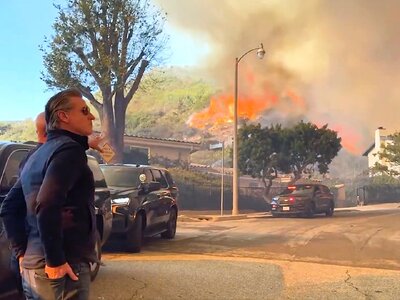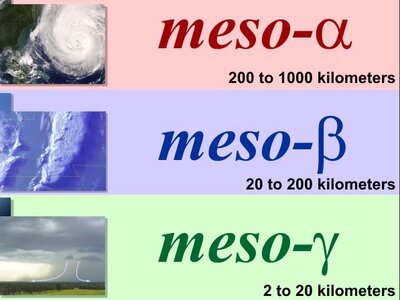William Monfredo
EF4
Worth a look and some comments...

I know Mike does not want a disaster review board to address climate issues, but if they are part of what contributes to a disaster, we cannot address the causes or develop a good prevention strategy if nobody considers whether they are relevant to a particular disaster.
If politicians actually followed the findings, they would 1) undertake efforts to combat climate change, and 2) work on finding ways of adapting to it. Of course that can't change what has already happened, but it might prevent something of the same severity from happening again. And that general principle applies to anything a Disaster Review Board might do. Nothing they could do after the fact would make any difference in what happened, but it might prevent it from happening again, or reduce the severity of future disasters. Isn't that the point of any kind of disaster review board? Just like the NTSB?Okay, John, I'll bite.
What difference would it have made to the people of North Carolina if "somebody" found Helene's awful flash floods were due in part or in whole due to climate change? Please be specific.
By people of North Carolina, I mean the victims and the indirect victims (e.g., people who lost their jobs in Asheville even through their homes were okay). How will they benefit from learning that climate change affected Helene's rains?What difference would it have made to the people of North Carolina if "somebody" found Helene's awful flash floods were due in part or in whole due to climate change?
My gosh, the U.S. has spent $1.5 trillion on climate change and the world has spent north of $6 trillion. Climate alarmists keep trying to fool people into thinking little or nothing has been done. We are spending ourselves into poverty ($36 trillion deficit and adding another trillion every 100 days) on this topic.If politicians actually followed the findings, they would 1) undertake efforts to combat climate change,
I have a friend in Asheville in a similar situation. House is OK, but their family had to endure 6 weeks without running water. I am quite sure he would appreciate any action that would reduce the likelihood of that happening again.You didn't come close to answering my question, John.
Let me pose it again:
By people of North Carolina, I mean the victims and the indirect victims (e.g., people who lost their jobs in Asheville even through their homes were okay). How will they benefit from learning that climate change affected Helene's rains?
Over how many years, Mike? The GDP for the U.S. in 2024 is going to come in around 30 trillion. So depending on how many years you are talking about for that total, that is maybe 1 percent of the GDP. IMHO a good investment, given the level of damage that disasters related to climate change are causing and are going to cause in the future if we don't do more to address the problem. And spending to reduce climate change is not all a negative. Many jobs have been created in Industires such as wind and solar energy. I think "invested" is perhaps a better word than "spent."My gosh, the U.S. has spent $1.5 trillion on climate change and the world has spent north of $6 trillion. Climate alarmists keep trying to fool people into thinking little or nothing has been done. We are spending ourselves into poverty ($36 trillion deficit and adding another trillion every 100 days) on this topic.
There are no 'subsides' unique to the fossil fuel industry. They are referring to depreciation which every business, including commercial weather companies, receives. I've challenged dozens of people who have made this contention about subsidies to prove me wrong and not one has.Also, according to the IMF, the United States spent $760 billion in 2022 alone on fossil fuel subsidies.
It helps them to the same extent as a finding that evacuations were mishandled or avoidable mistakes were made in the water supply system. In other words, it makes no difference to people who have suffered from this disaster, but might reduce the severity of future disasters. That is why any Disaster Review Board needs to be able to look into all causes and contributing factors to a disaster without any pre-censorship on what it can or cannot look into.That said, let's assume that "shifting weather patterns" (a tautology if there ever was one) are caused by global warming. How does that help the people trapped because EM's and police screw up the evacuation? How does it help people when the fire hydrants are dry? How does that help when the NWS screws up a tornado warning?
Mike, despite your legitimate concerns about problems with current warning systems, I think even you would agree that warnings are a lot better now than they were in the 1920s, 1930s, and before. So it may not be that storms back then were worse, but the warning systems, to the extent they existed at all, were. I tie many of today's disasters to climate change largely because that is the position of a sizable majority of weather and climate scientists, and because it looks that way to me. For example, 15 of California's 20 most destructive fires have come since 2015. Sure there are other contributing factors such as inflation, population growth, and sprawl, but climate change also seems to be a factor via processes such as more extreme wet-dry periods and mroe intense storms that generate more wind - both of which contribute to fires. So it makes sense to me. That said, I do not think climate change plays a role in each and every disaster that occurs, but I also think it is excessive to argue that it is never a factor.If the the weather is worse now (it isn'!!) than it used to be, how is it that almost all of the "worst" U.S. weather occurrences (worst tornado, worst hurricane, worst drought, worst flood, highest state temperature records) occurred in the 1920's and 1930's? And, if those were to occur again, what would stop you, John and others from blaming it on 'climate change' when we know Mother Nature is completely capable to causing that weather on her own?
I agree that we are in 80% agreement.I will end by saying I think we are in about 80 percent agreement. We agree on the need for a Disaster Review Board. It is only the scope of what can be addressed where we disagree.
Destructive (e.g., acreage) or expensive? Sincere question.15 of California's 20 most destructive fires have come since 2015

After witnessing the continued decrease of involvement in the SpotterNetwork staff in serving SN members with troubleshooting issues recently, I have unilaterally decided to terminate the relationship between SpotterNetwork's support and Stormtrack. I have witnessed multiple users unable to receive support weeks after initiating help threads on the forum. I find this lack of response from SpotterNetwork officials disappointing and a failure to hold up their end of the agreement that was made years ago, before I took over management of this site. In my opinion, having Stormtrack users sit and wait for so long to receive help on SpotterNetwork issues on the Stormtrack forums reflects poorly not only on SpotterNetwork, but on Stormtrack and (by association) me as well. Since the issue has not been satisfactorily addressed, I no longer wish for the Stormtrack forum to be associated with SpotterNetwork.
I apologize to those who continue to have issues with the service and continue to see their issues left unaddressed. Please understand that the connection between ST and SN was put in place long before I had any say over it. But now that I am the "captain of this ship," it is within my right (nay, duty) to make adjustments as I see necessary. Ending this relationship is such an adjustment.
For those who continue to need help, I recommend navigating a web browswer to SpotterNetwork's About page, and seeking the individuals listed on that page for all further inquiries about SpotterNetwork.
From this moment forward, the SpotterNetwork sub-forum has been hidden/deleted and there will be no assurance that any SpotterNetwork issues brought up in any of Stormtrack's other sub-forums will be addressed. Do not rely on Stormtrack for help with SpotterNetwork issues.
Sincerely, Jeff D.
